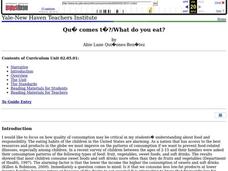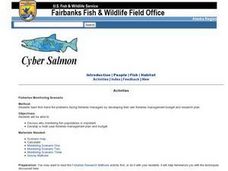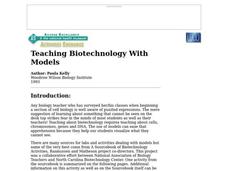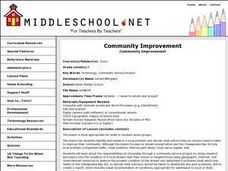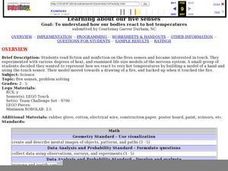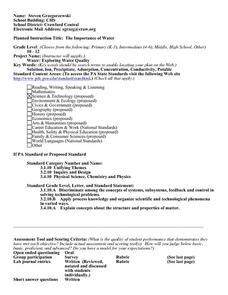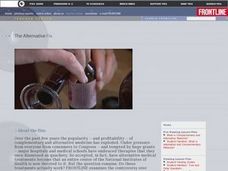Curated OER
No Name Calling
Students use literacy skills to gain information about tolerance. In these lessons on acceptance, student read stories, answer questions, survey students, and plan a citizenship week to encourage participation in a No Name Calling week.
Curated OER
Qué comes tú?/What do you eat?
Young scholars make healthy decisions about managing food choices for more nutritious and healthy consumption through this series of lessons.
Curated OER
Physical Fitness and Obesety
High schoolers use Internet web sites to discover how physically fit they truly are. Each group must use three web sites to answer questions and make an assessment of the person they have. Each group report back to the class what they...
Curated OER
A Day in the Life of Bill C-One: Canada's Parliamentary System
Studnets explore the procedure that makes bills into laws, through research and class discussion. They conduct public opinion and media research surveys and discuss the impact they have on deliberations conducted during the passage of a...
Curated OER
Create a Career Flyer: Marine Mammal Rescue
Students study prerequisites for a career. After they explore a selected career, students create a tri-fold flyer describing the positive aspects of the job. Students include job description, skills, education, salary and work...
Curated OER
Looking into Careers: Doing What I Like and Liking What I Do
Students explore careers. In this service learning instructional activity, students consider the value of job satisfaction and explore non-traditional jobs related to animal welfare.
Curated OER
Trout In The Classroom
Learners have trout in their classroom and complete journaling, checklists, temperature checking, and ammonia level recording. In this trout lesson plan, take weekly observation records of their trout.
Curated OER
Carpooling and the Environment
Students investigate carpooling and determine to what extent it occurs in their community for a carpool challenge. In groups, students create a survey then collect, calculate and record data to determine how much pollution could be...
Curated OER
Fisheries Monitoring
Students discuss why monitoring fish populations is important. They develop a multi-year fisheries management plan and budget.
Curated OER
ECOLOGICAL BIOASSAY OF COPPER SULFATE IN DAPHNIA MAGNA
Students use this lab as a follow up to the introduction of the ecosystems and productivity levels, bioassays and what and how they measure, and Daphnia magna as an index organism, i.e., a species whose health within an ecosystem...
Curated OER
Turn off your Engines!
Learners explore how idling vehicles contribute to the greenhouse gas emissions and climate change. They conduct a survey of idling in their community. Students calculate and develop corresponding graphs of the carbon dioxide produced...
Curated OER
Watersheds
Students discover the importance of watersheds and how they impact other bodies of water. Using a map, they identify and analyze a watershed in their local area and evaluate the health of the water nearby. In groups, they plan their...
Curated OER
Rapid Mycological Assessment
Students examine types of mycology methods. They practice using new vocabulary and answer key questions. They complete a field survey and analyze their results.
Curated OER
Apple Eaters
Students sample a variety of apples and graph group results for the class favorites. They orally explain the graph.
Curated OER
Bioethics And Fetal Tissue Research
High schoolers are introduced to the topic of fetal tissue implantation. In groups, they examine a case study and share information with the rest of the class. Then they do a reflective writing assignment to assess understanding of the...
Curated OER
Global Water
Learners collect data on their household water use and calculate how many gallons of water a person uses per day. They investigate how students in different parts of the world get their drinking water.
Curated OER
Teaching Biotechnology With Models
Students are introduced to biotechnology by using models. The teacher uses A Sourcebook of Biotechnology Activities, Rasmussen and Matheson project co directors. One of the activities in the book is: students use a scale models to very...
Curated OER
Brushing Teeth Halts Heart Disease
Ninth graders examine the causes and effects of Heart Disease. In this ESL Current Events lesson, 9th graders read an article on Heart Disease. Students complete guided questions on the reading.
Curated OER
Community Improvement
Students examine a local body of water to determinet the health of its ecosystem and monitor it during the year. If needed they write a report on any conditions that need improvement including photographs and relevant data.
Curated OER
Learning About Our Five Senses
Young scholars study the sense of touch and various degrees of heat. They design a model that displays how the human hand reacts to heat using a touch sensor.
Curated OER
Dealing with Growth and Change
Students discuss the right and wrong actions of a young Navajo boy. Using that information, they compare and contrast his culture to their own. In groups, they create a newspaper or poster showing the cultural contributions of the...
Curated OER
The Importance of Water
Young scholars explore the importance of water. They discuss why water is important and students design an experiment that evaluates the water quality and methods of improving water quality. Young scholars perform testing and report...
Curated OER
Green Space in the City
Students identify the different kinds and uses of green space that exist in an urban area. They create maps of local parks and research the history of each park. They conduct a survey of residents near the park and interview a park...
Curated OER
The Alternative Fix
Pupils explore the history of the government's involvement in medicine. They examine the popularity of alternative medicine in today's society and the dangers that some alternative medicines may pose. Students research the development...

